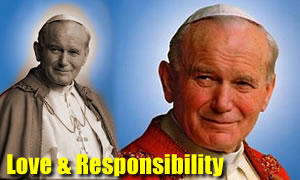


 Editor’s Note: This is the fourth in a series of articles written by Dr. Edward Sri on Saint John Paul II’s Love and Responsibility.
Editor’s Note: This is the fourth in a series of articles written by Dr. Edward Sri on Saint John Paul II’s Love and Responsibility.
How could Mr. Right turn out to be so wrong? Many young people have had the experience of feeling that they were in love with someone who at first seemed absolutely wonderful, only later to be greatly disappointed in the person, disillusioned about the relationship, and perhaps even down on the opposite sex as a whole.
In his book Love and Responsibility, John Paul II - then Karol Wojtyla - explains why this often happens to men and women and how we can avoid such disillusionment in the future.
More Than Physical
In the last issue, we considered one powerful aspect of the attraction between men and women: sensuality. And we saw how this physical attraction is often characterized by a longing to enjoy the body of another person as an object of pleasure.
There is a second kind of attraction, however, that goes beyond physical desire for the body. Wojtyla calls it "sentimentality." This represents more of an emotional attraction between the sexes.
For example, when boy meets girl, in addition to noticing her "good looks," he also may find himself powerfully drawn to her femininity, her warm personality, her kindness - or as Wojtyla calls it, her feminine "charm." Similarly, when girl meets boy, she not only may recognize that he is handsome, but also may find herself having strong feelings and admiration for his masculinity, his virtue, the way he carries himself - or as Wojtyla calls it, his masculine "strength."
Such emotional reactions toward persons of the opposite sex happen all the time. They can develop gradually between a man and a woman, or they can happen in the first instant they meet each other. We may experience sentimental affection for a spouse, a co-worker, or long-time friend. Or we may experience it toward a person we're introduced to at a meeting, a stranger we see at the mall, or even a fictional character we watch on TV.
Sentimentality can become part of what leads to authentic love. But if we are not careful, we can easily become enslaved to our emotions in ways that prevent us from truly being able to love other persons.
A Sinking Ship
Love should integrate our emotions. In its fullest form, love is not meant to be a cold, calculated decision, devoid of feelings. A spouse saying, "Honey, I love you. I have no feelings at all for you, but know that I am committed to you," is not the ideal situation. Our emotions are meant to be caught up into our commitment to our beloved, thus enriching the relationship and giving us an even deeper experience of union with the other person (cf., p. 75). As Wojtyla explains, "Sentimental love keeps two people close together, binds them - even if they are physically far apart - to move in each other's orbit. . . . A person in this state of mind remains mentally always close to the person with whom he or she has ties of affection" (p. 110).
This is why Wojtyla stresses that in any emotional attraction, the question of truth about the person is crucial: "Is it really so?" We should be asking ourselves, "Does he or she really have these qualities and virtues I'm so attracted to?"
However, Wojtyla is concerned that people today often think of love only in terms of feelings. His concerns seem all the more applicable for a culture like ours, in which love songs, romance films, and TV shows constantly play with our emotions and get us to long for quick, emotionally thrilling relationships like the ones Tom Hanks and Meg Ryan seem to find in the movies.
Real love, however, is very different from "Hollywood love." Real love requires much effort. It is a virtue that involves sacrifice, responsibility, and a total commitment to the other person. "Hollywood love" is an emotion. It's something that just happens to you. The focus is not on a commitment to another person, but on what is happening inside you - the powerful good feelings you experience when you're with this other person.
The Titanic phenomenon of the late 1990s demonstrates how many people have bought into the illusion of "Hollywood love." Millions of young Americans returned again and again to experience the intensely emotional romance between the two main characters in this film - a romance that is developed between two people who really don't know each other and have no true commitment to each other, yet is deeply felt by viewers to be the ideal kind of love that would have lasted a lifetime. With this kind of a model to imitate, it's no wonder so many of our real-life relationships are ending in a shipwreck.
Of course, our feelings can and should be incorporated into a more fully developed love (a theme we will explore in subsequent articles). However, when we are carried away by our emotions, we end up avoiding a very important question that is crucial for the long-term stability of a relationship: the question of truth. We must first and foremost consider the truth about the other person and the truth about the quality of our relationship with him or her.
Avoiding the Question of Truth
One danger of making feelings a measure for our love is that our feelings can be very misleading. In fact, Wojtyla says feelings themselves are "blind," for they are not concerned with knowing the truth about the other person. Thus, our feelings alone do not make a good compass for guiding our relationships.
He explains that we discover truth through using our reason. I know 2 + 2 = 4 not because I feel it equals 4. I come to certainty about this truth through my reason. Our feelings, on the other hand, do not have the job of seeking truth, Wojtyla says.
Therefore, our feelings will not be as helpful of a guide for seeing the honest truth about another person and the truth about a relationship. "Feelings arise spontaneously - the attraction which one person feels towards another often begins suddenly and unexpectedly - but this reaction is in effect 'blind'" (p. 77).
This becomes especially clear when we consider what happened to our emotions after the fall. Before sin entered the world, man's intellect easily directed his will to choose what is good and to guide his emotions so that his passions would be directed toward that good.
After the fall, however, the intellect does not see the truth clearly, the will is weakened in its resolve to pursue what is good, and our emotions are no longer properly ordered and are left going in many different directions. Hence, we now experience much instability in the emotional sphere and many chaotic ups and downs (love-hate, hope-fear, joy-sadness, etc.) throughout our lives. Yet, quite ironically, the modern view of love tells us to turn precisely to our "feelings" - to look right in the middle of this emotional roller coaster ride - to find an infallible measure of our love. No wonder there is so much confusion and instability in relationships today!
To be continued
Dr. Edward Sri is a nationally-known Catholic speaker who appears regularly on EWTN and is the author of several Catholic best selling books, including The New Rosary in Scripture: Biblical Insights for Praying the 20 Mysteries (Servant) and Men, Women and the Mystery of Love: Practical Insights on John Paul II’s Love and Responsibility (Servant).


I have been thinking a great deal about my experience at Reconciliation this past Saturday. I felt an intense and unexplainable urge to go and confess my sins when I woke up that morning. I try to go every six weeks or so, but this was no routine visit to the priest for me. I needed to unburden myself of the numerous venial sins I had committed since I last participated in this Sacrament.
Purest Gold: God's Refining Fire in our Lives »
After salvation, many young Christians wonder if there's anything more to their newfound faith than just the security blanket of "being a Christian." Time and time again, God shows himself as a "refiner," and our lives are as gold. God started leading me in this study to understand what He was doing in my life, as well as in the lives of others.
Picking up my pen to write this column, I couldn’t imagine how time flies. Since the last publication of this column I have gone through a lot, especially the loss of my dear mother to whom I dedicate this article. Not only her, but seems I lost a whole generation of my close family.
How to Achieve Business Excellence »
“Do you see a man who excels in his work? He will stand before Kings; He will not stand before unknown men.” Proverbs 22:29
Spiritual Development for our Youth »
Most of us youth in today's fast moving world are easily thrown off by difficulties and worries.
The theme of conversion is a thread that runs all through Lent, but conversion takes on different aspects throughout the phases of Lent. The first two and a half weeks focused on the interior turning of hearts; the liturgy urges the faithful to reflect and examine consciences thoroughly.
Saint Josephine Bakhita »
Feast Day: February 8
Patron Saint Of: Sudan
Saint Josephine Margaret Bakhita was born around 1869 in the village of Olgossa in the Darfur region of Sudan. She was a member of the Daju people and her uncle was a tribal chief. Due to her family lineage, she grew up happy and relatively prosperous, saying that as a child, she did not know suffering.
Catholics Must Fast More Intensely This Lent»
The Norbertine Canons of St. Michael's Abbey have created this digital Lenten retreat so that you can journey through this holy season alongside them. If you want to have one of your best Lenten seasons yet, join us in our Lenten Program "The Great Fast" - https://theabbotscircle.com/the-great-fast-join
When Your Faith Is Put to the Test - Bishop Barron's Sunday Sermon»
Friends, we come now to the Second Sunday of Lent, and we’re on both dangerous and very holy ground with the first reading from the twenty-second chapter of Genesis. The ancient Israelites referred to it as the “Akedah,” which means the “binding”: Abraham binds and is ready to sacrifice Isaac at God’s command.

Copyright © 2002-2024 THE BEACON INTERNATIONAL CATHOLIC MAGAZINE. All rights reserved.
another mc.rufus interactive web design